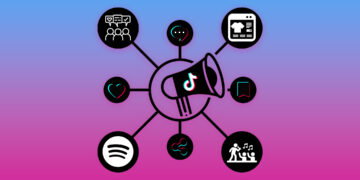The biased focus on viral moments

- Why artists who go viral sign with a major
- How the majors outsource marketing to the artists
- Why the focus on content can turn into a boomerang
In the article “The dark side of Creator Economy” we already discussed how difficult it is for many artists to be caught in the content spiral. Now this topic has received an additional component, with various artists reporting that their labels do not want to release new songs without a viral moment on TikTok. We’re not talking about newcomers here, but artists with established fanbases and millions of streams. This again raises questions about the role of musicians as content creators, but also about the role of labels.
No deal without reach
Of course, everyone agrees that very few artists can do without social media and its reach. It’s also clear that the days of labels building up artists are mostly over. Nowadays, artists are usually only signed once they have built up their own reach and fanbase. Or when they have gone viral on TikTok. The move to a label happens for different reasons, although two of the main ones are: Money, usually in the form of an advance, and the undisputed marketing power that the majors bring to the table.
The fact that you need viral moments to even get signed is more or less standard. That you can’t put your feet up as soon as you have the deal in your pocket is just as clear. But if the label outsources the marketing to the artist, this is quite questionable and seems to be a refusal to work. Last but not least, this is likely to make even more artists think twice about whether a record deal is really the right thing for them.
Going viral is not a strategy
It’s undisputed that TikTok is enabling more artists than ever before to reach a wide audience, even if they’re starting from virtually zero. However, it is also known that TikTok’s algorithm is unpredictable and viral moments cannot be planned. This is exactly where the experience and also the budget of labels should come into play, which can build a strong marketing campaign that does not rely solely on unpredictable viral moments, but offers some consistency and strategy. Going viral is an event that may or may not happen, but it is not a strategy.
The battle for attention
As mentioned before, it has become much more difficult to get attention compared to the time of lockdowns and other restrictions. People are out more, have less time in general and thus the fight for their valuable attention intensifies. It seems that in this extremely competitive environment, labels don’t want to rely on their marketing power alone anymore and therefore demand additional viral moments from the artists, effectively taking over label work in addition to their already numerous tasks.
It is therefore not surprising that more and more artists are resisting being degraded to content machines by their labels. Especially when artists have to post things that don’t feel right to them and that only serve to increase their reach, the fans, who have a good sense for authenticity, notice this. Thus, this focus on content can even turn out to be a boomerang. Last but not least, you should never underestimate how time-consuming a professional social media presence is, especially when it’s not just text posts, but also videos for TikTok, YouTube, Reels, etc. all of which have to be produced.
Conclusion
Labels can expect artists to market themselves on social media. But they are also required to support the artists, to respond to their needs, and to understand when they feel uncomfortable about something. Preventing musicians from burning out must be just as important as reach. Ultimately, the focus should not be solely on viral moments and the largest possible audience. It is much more important to find the right niches and build small but constantly growing and active fanbases in them.











